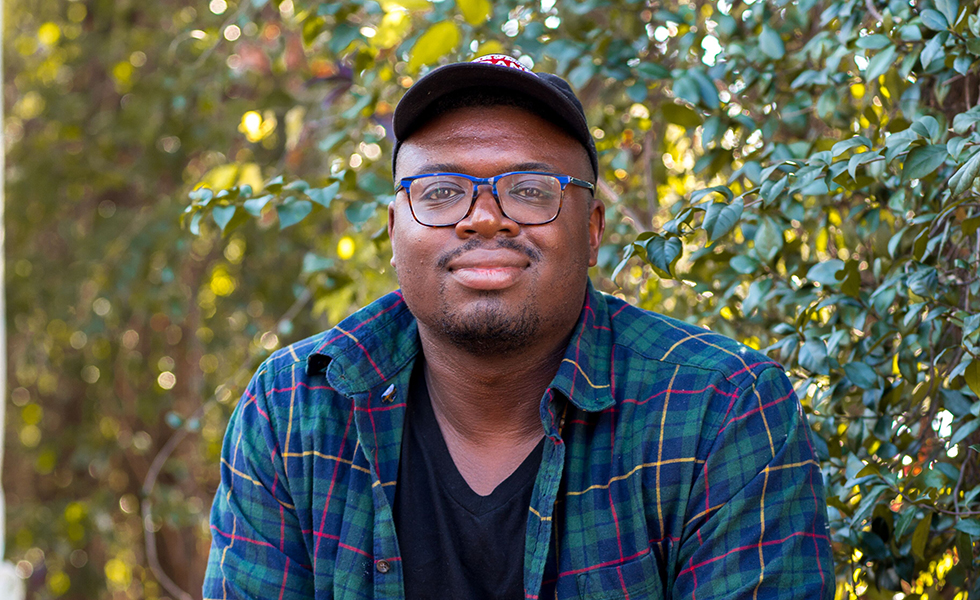
Short Story Contest Finalist “Fire In Galveston”
Above: Ken Wheatcroft-Pardue
Welcome to the second installment of The Texas Observer’s 2013 short story contest, judged by Dagoberto Gilb. Throughout September we’ll be publishing the contest’s four finalists, one per week, leading up to the winning story, which will appear in the Observer’s October Books Issue and online early next month, along with a list of honorable-mention entries. In case you missed it, the first finalist we presented was Dini Karasik and her story “Amalia on the Border.”
Today we offer Ken Wheatcroft-Pardue’s “Fire in Galveston,” a three-part narrative about fires in the Oleander City—some literal, some metaphorical, and some still burning.
Fire in Galveston
By Ken Wheatcroft-Pardue
1900
Seawater shot from between train trestles that jutted out into the Gulf, erupting like geysers, sending sprays of saltwater on those bystanders who just for a lark had come out to watch a storm come in on a lazy Saturday morning. But then the bathhouses collapsed, like sand castles at high tide. And the crowd, crestfallen now, waded home through water already shin-high.
That night hundreds of tiny frogs clung to every pole and porch, while dark slates, blown from rooftops, spun through the thick air, striking at faster and faster intervals into houses or anything poor enough to be stuck outside in the endless squall and the horizontal rain that never stopped.
And for those in their homes, the waiting. A thunderclap, the rattle of leaded panes. The glass festoons hung from chandeliers, trembling in the muggy stillness. Then the floodwaters muscled in—past the joists, past the clouded stained-glass doors. And the houses began to float from their pilings.
After midnight, the dead danced limp as jellyfish. And with them, pieces of houses—a porch railing, a cornice. And more: well buckets, branches, whole trees, bay horses, junkyard dogs, glass bottles, spittoons, round pucks of horse manure tumbling end over end, a sign advertising Gold Dust Cleaner (“Nothing but water is needed”).
The next day, houses piled upon houses. Bodies were trapped inside, their arms hooked around loved ones, if any, or objects—a stitched pillow, a porcelain doll, a photograph in a gilded frame. For a few hours, you could hear their cries to be rescued from the water-drenched homes swept off their pilings—swept blocks and blocks, then crashed together like playthings of a petulant, borderline-mad God.
That Sunday morning survivors spied bodies in trees, every stitch of clothing ripped from them, in every kind of position imaginable. The September sun tanned their dead skins, their carcasses bloomed like flowers on the now-naked windblown branches, while seagulls got their first taste of human flesh.
Schools of bloated corpses went out with the tides, washing ashore again and again. Along the beaches, funeral pyres blossomed. Dead bodies stacked like cords of wood one on top of another were set aflame. The sweet incense of body gristle rose into the dank air.
1965
“Fire!” a woman screamed as she bustled into the corner grocery.
The cashier shut off his transistor radio, cutting off John Lennon in mid-chorus (“It’s been a hard day’s . . .”), then set a black phone on the counter.
“Hudson 4-2637,” the cashier said, careful to enunciate each syllable.
The woman’s skin was dark as Dr. Pepper, and while she spoke, her bloodshot eyes oscillated like a fan. When she hung up, a light-skinned fat woman in a black dress with red roses blooming came to her side. Then they both jogged out the door as if they were one person wearing three-quarters of a black dress with roses blooming and one-quarter of a powder-blue housecoat.
After that, the boy slapped down his dime for his soda, then scampered out. He chugged hard down the sandy trail, dodging the prickly Bermuda to his grandma’s cleaners. Already a swarm of kids was racing toward the black smoke billowing from a second-story window of the apartments on the corner.
“There’s a fire, Grandma!”
She stuck her head out the door. “So there is,” she said.
Then they sat on her stoop to watch the black smoke and ashes float just above the jostling crowd. The boy could make out the low whine of a fire engine as it echoed against the warehouses and shotgun shacks along 50th.
When it skidded to a stop, firemen in yellow hats and black slick coats jumped out. Right off, three of them rushed into the tenement. The rest sprayed white blasts of foamy liquid that instantly peeled the walls of their layers of whitewash.
Then out the front door, a lone fireman carried a black man fireman-style, over his shoulders, down the porch steps. The burned man’s skin hung from his arms like the fringe on the leather jackets the boy then lusted for.
His grandmother stood up, shook her head, “No sympathy,” she spat out. “That man smoked and fell asleep. He deserves to die. He put everybody in danger and didn’t give a good goddamn.”
The boy noticed how when she shook her head, the loose skin under her chin flapped like a lizard’s. Then she did something he never saw her do before. She cleared her throat and let fly a wad of phlegm. With open-mouthed awe, he watched its wobbly trajectory as it arced over his head, somersaulting through the air to plop in the sandy loam more than five yards away. She then turned on her heels, went back to work.
The boy, transfixed by the goings-on, stayed on the stoop, sipping his grape Nehi. He spotted two firemen coming out the door, carrying what he guessed was the man’s charred mattress. There was a hole in the middle of it. Its soft white insides, black at the edges, dangled, caressing the dirt yard.
The pair stopped, rocked the mattress slowly, and on the count of three tossed it. It landed near the corner on the only patch of grass in the dirt yard that was now quickly turning to mud.
The ambulance, spewing out its glorious noise that echoed against shop windows and shotgun shacks, sped away carrying the burned man the grandmother had no sympathy for. But just as its siren got out of earshot, the man’s wife returned. And somehow she recognized the waterlogged blackened mattress.
Bending over it, she screamed, then broke for the door. Grim-faced men in white dress shirts held her back. She clawed at them, screaming in a high-pitched voice something incomprehensible that sounded like jagged glass.
1975
After midnight, a young man, his head down, his red Converses tramping down salt grass, made his slow way through the mist along the Farm to Market. Horses behind wooden fences snorted at his footfalls. Their eyes glinted knives in passing headlights.
Two shit-kickers pulled off the road.
“Wanna ride?”
They were an arm’s length from him.
“OK.”
In the cab, the driver laughed. “We are high mothers, Quaalude crazies.” He cranked up an 8-track “Stairway to Heaven.”
The driver’s friend vacantly stared into his hands. “Hey man, where you headed?”
“A store,” the young man answered.
The driver nodded. Their eyes, heavy-lidded, clung to the night’s mist, while green dash lights animated their bearded, inebriated, almost empty faces. Then, as if choreographed, they pointed at the Stop-and-Rob’s sign as it blinked “CLOSED,” derisive laughter snorting from their noses.
The driver circled back, kicking up the shoulder’s gravel. Suddenly he slammed his brakes, squealed his tires, then muscled his Chevy off the Farm to Market, off the shoulder onto the salt grass. The driver and his friend clambered out and started, in the headlights’ glare, to tear down a wooden fence.
“Gonna be a big bonfire tonight.”
“Drugs and pussy, all night, all night.”
The young man climbed out of the cab and helped them stack the planks in the bed. Then they piled back in. The driver sped south down dark asphalt through the heavy fog-like mist. He turned sharply into a spur he could have only intuited. When it hit the sand, his Chevy fishtailed.
“Son of a bitch!” the driver’s friend spat out the side of his mouth.
On the beach, there was a whole tribe waiting, young men and women, some in bathing suits, some in jeans, sucking on longnecks and lit joints. When the truck skidded to a stop, they all ran to the bed, grabbing the wood willy-nilly, pitching it onto a fire. In no time, the fire grew to a bonfire as high as three men.
The tribe began to dance around the fire. Their shadows danced, and the flames too. To the young man, still in the truck, it was as if the dance controlled the dancers, like a Saint Vitus dance, a kind of drugged pyromania.
Then slowly he crept out the truck. No one noticed as he headed down the beach away from the fire, away from the dancers. Soon his hair was wet with mist. So soaked, drops rained from his beard. Cold moist breath of smoke, like a fire, somewhere, there. Right there. (Could it be real?) He squatted on his hams now in front of it, rubbing his hands. This fire, found.
This fire, this fire, this fire.


